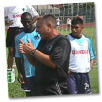Skepticism
This is from a very interesting website http://www.skeptic.com although I may not completely agree with all of their ideas I find them stimulating and thought provoking. With so much of the sheep walking , monkey see monkey do things we see today I think the following statements apply directly to what is happening in Athletic Development, Rehabilitation, Sports Science and Sports Medicine. I truly think a more skeptical critical mindset will cut out some of the noise, clarify issues and help to solve problems.
Some people believe that skepticism is the rejection of new ideas, or worse, they confuse “skeptic” with “cynic” and think that skeptics are a bunch of grumpy curmudgeons unwilling to accept any claim that challenges the status quo. This is wrong. Skepticism is a provisional approach to claims. It is the application of reason to any and all ideas — no sacred cows allowed. In other words, skepticism is a method, not a position. Ideally, skeptics do not go into an investigation closed to the possibility that a phenomenon might be real or that a claim might be true. When we say we are “skeptical,” we mean that we must see compelling evidence before we believe.
Skepticism has a long historical tradition dating back to ancient
Modern skepticism is embodied in the scientific method, which involves gathering data to formulate and test naturalistic explanations for natural phenomena. A claim becomes factual when it is confirmed to such an extent it would be reasonable to offer temporary agreement. But all facts in science are provisional and subject to challenge, and therefore skepticism is a method leading to provisional conclusions. Some claims, such as water dowsing, ESP, and creationism, have been tested (and failed the tests) often enough that we can provisionally conclude that they are not valid. Other claims, such as hypnosis, the origins of language, and black holes, have been tested but results are inconclusive so we must continue formulating and testing hypotheses and theories until we can reach a provisional conclusion.


1 Comments:
You are right, thats why top coaches and smart athletes will not fall for semantics and BS.
Post a Comment
<< Home